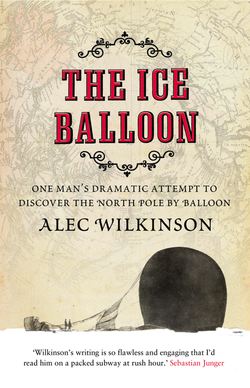Читать книгу The Ice Balloon - Alec Wilkinson - Страница 17
13
ОглавлениеOnce Andrée was grown, the only woman for whom he felt a strong attachment was his mother. “Her rich natural endowments, in which good judgment and sharp intellect dominate such characteristics as are commonly called feminine in this day and time, her remarkable will power and capacity for work, as well as her ability to endure and suffer, remind us of the old Norse women,” he wrote in a notebook. “Despite her seventy-five years she does not seem old. Her face has few wrinkles. It seems to belong rather to a woman of sixty. The impression of power still unshaken is heightened by her voice which lacks the sentimental, pleading tone one so often finds in older women. Her voice harmonizes with her exterior: firm, strong, almost gruff, but with an undertone of kindliness.”
A monument, in other words, erected by a child and tended into adult life—which must have been fatiguing. When Andrée felt himself drawn to a woman, what he called the “‘heart leaves’ sprouting, I resolutely pull them up by the roots,” he wrote. The consequence was that he was “regarded as a man without romantic feelings. But I know that if I once let such a feeling live, it would become so strong that I dare not give in to it.” An acquaintance wrote in a letter that Andrée appeared to have remained a bachelor for the sake of his mother, and for a while they lived with each other. When Andrée was asked why he had never married, he said of any woman who would be his wife that he would not “risk having her ask me with tears in her eyes to abstain from my flights, and at that instant, my affection for her, no matter how strong, would be so dead that nothing could ever bring it back to life.”
Figures from history occasionally rise up from the page as if they had merely been waiting, sometimes impatiently, for someone to speak to them. Andrée comes to life a little resentfully, as if interrupted. Through his devotion to his mother he may have been restricted emotionally from mature relationships with women. It is also possible that he was indifferent to showing, or incapable of expressing, any true warmth to another person, except in the narcissistic fashion of a child. His great mechanical abilities and inclinations toward solitude suggest a temperament that does not effortlessly engage in conventional exchanges, one that might easily be confused or defeated or embittered, and might find objects and tasks more agreeable than people. Not all of us want the same things from life. The mainstream forces its preferences on the minority, partly to sustain those preferences, but that doesn’t necessarily lend them any substance. Nowhere in Andrée’s writings or in the descriptions of him is there an indication of any but a cold-blooded sort of introspection, a capacity for assessing the success or failure of objects and tactics. The territory of feelings seems not to have been hospitable to him.
The only relationship with a woman that Andrée was known to have conducted was an affair with a woman named Gurli Linder, who became in the early twentieth century an admired critic of children’s literature. (Linder wrote the portrait of Andrée in The Andrée Diaries.) The affair, which occupied the last few years before he left—Linder in her brief writings on the matter says 1894 was their best and most untroubled year—was conducted so openly that Linder’s husband, a professor, asked her to behave with more restraint lest she embarrass him among their friends.
